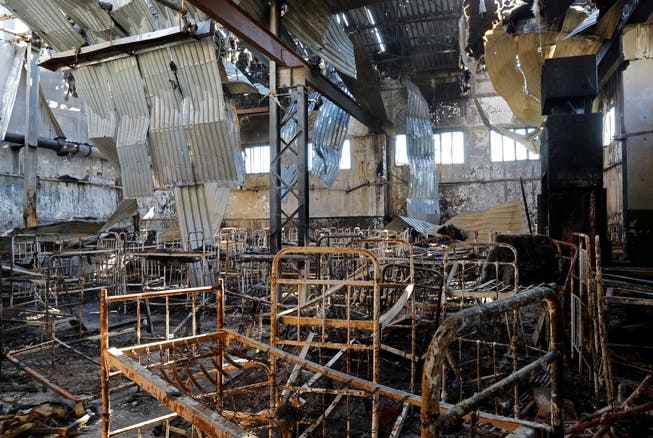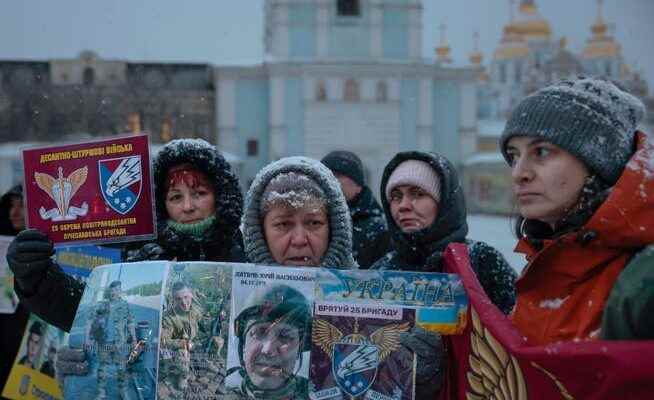With few exceptions, Moscow denies international organizations access to the detainees. Mistreatment also occurs in the Ukrainian camps, but systematic torture only in the Russian ones.
The fate of the Ukrainian prisoners of war is not only a very emotional question for their relatives.
In Ukraine, Europe is experiencing its biggest conflict since World War II – and the first in the social media age. The daily mass of videos and images from the battlefields is overwhelming. But it belies the fact that fundamental aspects of war disappear in an information vacuum. This includes the number of prisoners of war, about which there is complete uncertainty.
The only thing that is clear is that there are thousands – if only because Kyiv says it has already brought back 1,400 of its own soldiers as part of exchanges. Such official announcements are extremely rare: This is what Russia’s Defense Minister Sergei Shoigu said in June of 6500 Ukrainian prisoners of war, while Kyiv confirmed only 2000. There is no more recent information, although the topic arouses enormous public emotion in both countries.
Russians deny access
Two international organizations, the International Committee of the Red Cross (ICRC) and the United Nations High Commissioner for Human Rights (OHCHR), conduct visits to prison camps. However, only the ICRC is allowed access to facilities for Ukrainian POWs on Russian-occupied territory, and only to a very limited extent. The last visit was a few days ago, about which no details have been released. This reflects the discretion with which foreign delegates proceed in their mission.
After the alleged massacre of prisoners in the Olenivka camp, which was allegedly carried out by Moscow, Ukraine criticized the fact that the Red Cross did not more emphatically demand its right to visit the signatory state Russia, which is enshrined in the Third Geneva Convention. The ICRC referred to the lack of security guarantees from Moscow and expressed frustration: “A team is ready to visit all prisoners of war in the Donetsk region”, wrote it in October. “Blaming us for not getting access doesn’t help them or their families.”
The UN High Commissioner has also criticized this blocking attitude. “The fact that Russia has so far permanently denied us access is unprecedented,” explains OHCHR spokesman Krzysztof Janowski. “Even in the darkest moments of the Bosnian war, we worked on all sides.” A group of Ukrainian soldiers could only be met once, but questioning was not possible.

Dozens of Ukrainian prisoners of war died in Olenivka camp in July.
Officially, the refusal is justified by the fact that the organization has no mandate for the Russian Federation, which Moscow believes also includes the occupied Ukrainian territories. “On the Ukrainian side, on the other hand, we can visit any place we want.” This does not apply to the media, they were only allowed into the largest camp once, which is located in western Ukraine and housed several hundred prisoners.
torture and humiliation
Despite the different behavior of the conflicting parties, the UN organization has documented abuses on both sides. In a report published in mid-November she evaluated the statements of 334 Ukrainian and Russian prisoners of war about their experiences in detention. Those affected told of many cases of violence.
Two Ukrainian prisoners of war had to crawl 500 meters with broken legs to the nearest Russian position while their tormentors filmed them. A Russian victim told how Ukrainians offered their colleagues at checkpoints to beat a defenseless group of Russian detainees in a transport, which some did.
According to the report, both sides beat detainees, including with rifle butts and other hard objects, shocked them with electric batons and humiliated them. At least four Ukrainians died in custody because of failure to provide assistance or ill-treatment. OHCHR is trying to review dozens of other deaths.
The organization sees a particular need for clarification in a recent incident in the Luhansk region: one video shows Russian soldiers surrendering, another shows all 12 apparently dead, but a man dressed in black also appears who is apparently shooting at the Ukrainians. Various investigations should clarify what really happened.
Kiev’s commitment to the Geneva Convention
Nevertheless, the UN High Commissioner makes a clear distinction between the behavior of the two warring parties. It only found “a pattern of torture and ill-treatment” in Russian camps, while such incidents on the Ukrainian side occurred only sporadically and primarily in connection with arrests. Moscow uses violence, which includes the sexual humiliation of female prisoners, more systematically.
In addition, Kyiv has launched investigations into several cases of abuse against its own officials, while the Russians deny any wrongdoing. The results of the investigations remain to be seen. But the Ukrainians are committed to their obligations under the Geneva Convention and allow it to be reviewed. The OHCHR sees this as a key step: “Torture prevention begins with independent observers having access to prisoners.”
